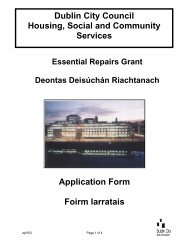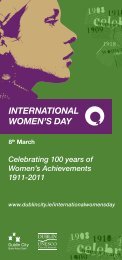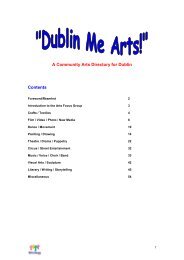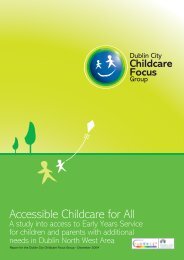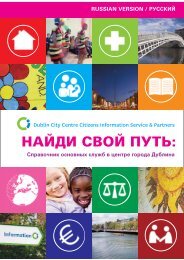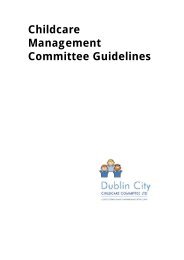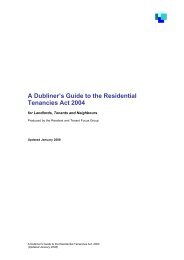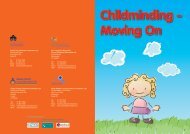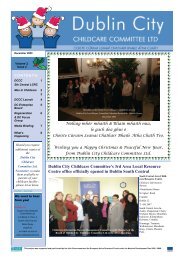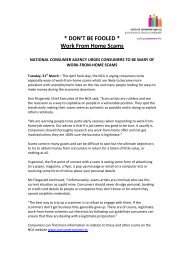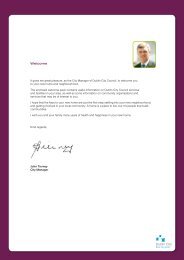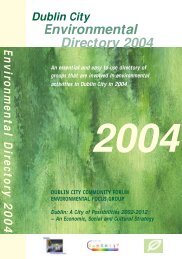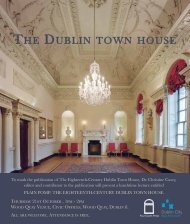Review 2006 - 2008 Action Plan 2009 - 2012 - Dublin.ie
Review 2006 - 2008 Action Plan 2009 - 2012 - Dublin.ie
Review 2006 - 2008 Action Plan 2009 - 2012 - Dublin.ie
Create successful ePaper yourself
Turn your PDF publications into a flip-book with our unique Google optimized e-Paper software.
<strong>Dublin</strong> City Development Board // <strong>Rev<strong>ie</strong>w</strong> <strong>2006</strong> – <strong>2008</strong> // <strong>Action</strong> <strong>Plan</strong> <strong>2009</strong> – <strong>2012</strong> | 2<br />
CHAIRPERSONS FORWARD <strong>2009</strong><br />
As Chair of the <strong>Dublin</strong> City Development Board since 2004 I am very<br />
pleased to introduce the second rev<strong>ie</strong>w of the original strategy and<br />
the new action plan for <strong>Dublin</strong> City.<br />
The original strategy “<strong>Dublin</strong> A city of Possibilit<strong>ie</strong>s” was a statement<br />
of hope and intention, a vision of the potential of a city and its<br />
people, anticipating the challenges and issues for the future. Its<br />
broad thematic approach created a flexible framework in which to<br />
engage all sectors of interest in the city. The establishment of the<br />
City Development Board under the Local Government Act 2001<br />
offered a new opportunity for <strong>Dublin</strong> City Council to embrace a wider<br />
influence for governance in the city through partnership and active<br />
engagement with representatives of state agenc<strong>ie</strong>s, the local development sector and the social<br />
partners of business, trade unions and community interest.<br />
The new structure has taken time to establish itself, to grow new relationships, and develop trust<br />
and confidence and shared values. Managing the range and complexity of issues emerging in a<br />
city context and harnessing the commitment and participation of 27 stakeholders has not always<br />
been easy but the evidence shows much has been ach<strong>ie</strong>ved since the inception of the Board as<br />
the summary of significant outcomes outlined in the range and diversity of actions undertaken.<br />
The Board, through the implementation of its shared vision and the cooperation of its<br />
stakeholders, has facilitated and supported improved integration and coordination of public<br />
services. It has proven to be open, flexible and responsive to initiating new measures and actions<br />
emanating from central government. It has made a significant contribution to policy formation at<br />
city level and has been innovative in the introduction of new information technology for the benefit<br />
of city communit<strong>ie</strong>s through www.dublin.<strong>ie</strong>.<br />
The outcome of our rev<strong>ie</strong>w allows us retain the guiding vision but to consolidate and focus on<br />
strategic themes and actions for the period to <strong>2012</strong>. The action plan outlines the need to have<br />
a flexible approach in dealing with the emerging issues from this time of social and economic<br />
uncertainty. The actions proposed demonstrate a strong focus on service integration and the<br />
need to move from vision to practical action.<br />
As an elected member of <strong>Dublin</strong> City Council and Chair of the Strategic Policy Committee on<br />
Transportation I have promoted greater integration and communication between the Strategic<br />
Policy Committees (SPCs) and the Board at policy level, which has strengthen the influence of the<br />
Board in the governance framework of the city. A new white paper is due on local government<br />
this year which I hope will lead to a greater strengthening of the role of the Board in future. Finally I<br />
would like to thank the members of the Board, Director and staff for their contribution to the work<br />
of the board since 2004 and their continued commitment and support to the programme of the<br />
Board. It has been my very great pleasure to have served as Chairperson since 2004 and I wish<br />
the Board every success in the future.<br />
Cllr Sean Kenny,<br />
Chairperson,<br />
<strong>Dublin</strong> City Development Board
<strong>Dublin</strong> City Development Board // <strong>Rev<strong>ie</strong>w</strong> <strong>2006</strong> – <strong>2008</strong> // <strong>Action</strong> <strong>Plan</strong> <strong>2009</strong> – <strong>2012</strong> | 3<br />
Directors’ Introduction<br />
The <strong>Dublin</strong> City Development Board was established under the Local<br />
Government Act, 2001. It works to create a strategic alliance for the<br />
City with in partnership with the four sectors of local government;<br />
local development; statutory agenc<strong>ie</strong>s and social partners, with <strong>Dublin</strong><br />
City Council as the lead agency. The DCDB continues to offer a new<br />
approach for ‘joined up’ government for the City.<br />
The aim of the Board is:<br />
“To enhance the coordination and integration of public service delivery,<br />
while maximising the contribution of all stakeholders to the betterment<br />
of the social, economic and cultural life of the City.”<br />
The Board does this through the implementation of its ten year strategy for the City, ‘<strong>Dublin</strong> – A City of<br />
Possibilit<strong>ie</strong>s, 2002-<strong>2012</strong>’, - a strategic response to the issues and challenges facing the City to <strong>2012</strong>.<br />
The latest rev<strong>ie</strong>w presents an opportunity to reflect on significant outcomes of the work of the Board in<br />
the period up to <strong>2008</strong> and to take account of the changing policy and challenging environment facing<br />
the city. The enhanced interagency cooperation will ensure that each member agency has a shared<br />
vision of what needs to be done.<br />
The <strong>Rev<strong>ie</strong>w</strong> returns to the broad Strategy and looks to consolidate the many themes into key priorit<strong>ie</strong>s<br />
and actions we can focus on until <strong>2012</strong>.<br />
The priorit<strong>ie</strong>s identif<strong>ie</strong>d by the Board are relevant to current and emerging issues facing the city:<br />
■■<br />
■■<br />
Ensuring continued focus on social inclusion and cohesion<br />
Supporting enterprise and economic development<br />
■■ Promoting and facilitating measures towards a Family Fr<strong>ie</strong>ndly City, increased childcare and play<br />
policy for children a<br />
■■ Strengthening and promoting its Anti-Racism and Diversity <strong>Plan</strong> for a more inclusive and diverse<br />
city<br />
■■ Neighbourhoods and building communit<strong>ie</strong>s by utilising the Asset based approach to such<br />
development<br />
■■ Promoting active engagement of citizens with the assistance of the community forum and the area<br />
based integrated compan<strong>ie</strong>s<br />
The revised strategy concentrates on three main themes<br />
■■<br />
Key theme Social Inclusion, encompassing the following issues<br />
◆◆ SIM Group<br />
◆◆ Social Inclusion mapping<br />
◆◆ Older persons People with disabilit<strong>ie</strong>s<br />
◆◆ Migrant new comit<strong>ie</strong>s<br />
◆◆ Travellers Community<br />
◆◆ Development Conversations on democracy<br />
◆◆ Children<br />
◆◆ RAPID<br />
◆◆ Unemployment<br />
◆◆ Education<br />
◆◆ Poverty<br />
◆◆ Digital Inclusion Projects<br />
◆◆ Children’s services
<strong>Dublin</strong> City Development Board // <strong>Rev<strong>ie</strong>w</strong> <strong>2006</strong> – <strong>2008</strong> // <strong>Action</strong> <strong>Plan</strong> <strong>2009</strong> – <strong>2012</strong> | 4<br />
■ ■<br />
■ ■<br />
Key theme Economic development, focusing on retaining employment and creating new<br />
opportunit<strong>ie</strong>s for growth<br />
Key theme Environmental sustainability, focusing on addressing the balance between growth<br />
and protecting environmental standards<br />
The adoption of these priorit<strong>ie</strong>s and implementation of proposed actions can contribute to the wellbeing<br />
and quality of life of people in the City. We have also looked at issues concerning governance<br />
of the Board and made structural changes, which will support and enhance the effectiveness of the<br />
business of the Board. I am satisf<strong>ie</strong>d that, with the support of the Board and staff, the actions we have<br />
set out are ach<strong>ie</strong>vable and that we will have the flexibility to respond to other issues and initiatives<br />
as they arise. I would like to acknowledge the leadership of the Chairperson Cllr Sean Kenny and<br />
the contributions of the Board Members and members of staff to the work of the rev<strong>ie</strong>w and the<br />
development of the new action plan. I am confident we can build on the success to date by utilising<br />
the energy and commitment of the Boards membership.<br />
Martin Kavanagh,<br />
Director,<br />
Community & Enterprise
<strong>Dublin</strong> City Development Board // <strong>Rev<strong>ie</strong>w</strong> <strong>2006</strong> – <strong>2008</strong> // <strong>Action</strong> <strong>Plan</strong> <strong>2009</strong> – <strong>2012</strong> | 5<br />
Contents<br />
1. Chairperson’s Foreword........................................................................................................... 2<br />
2. Director’s Introduction.............................................................................................................. 3<br />
3. Table of Contents..................................................................................................................... 5<br />
4. <strong>Dublin</strong> City Development Board............................................................................................... 6<br />
5. Board Members....................................................................................................................... 7<br />
6. <strong>Rev<strong>ie</strong>w</strong> 2002 – <strong>2006</strong>................................................................................................................ 8<br />
7. Priorit<strong>ie</strong>s <strong>2006</strong> – <strong>2008</strong> Update................................................................................................ 10<br />
Social Inclusion.............................................................................................................. 10<br />
Enterprise and Economy................................................................................................ 15<br />
Family and Children........................................................................................................ 18<br />
Neighbourhoods: Building Communit<strong>ie</strong>s........................................................................ 20<br />
Migrant New Communit<strong>ie</strong>s............................................................................................. 21<br />
RAPID............................................................................................................................ 23<br />
Community Forum......................................................................................................... 24<br />
8. <strong>Action</strong> <strong>Plan</strong> <strong>2009</strong> – <strong>2012</strong>........................................................................................................ 27
<strong>Dublin</strong> City Development Board // <strong>Rev<strong>ie</strong>w</strong> <strong>2006</strong> – <strong>2008</strong> // <strong>Action</strong> <strong>Plan</strong> <strong>2009</strong> – <strong>2012</strong> | 6<br />
<strong>Dublin</strong> City Development Board<br />
<strong>Dublin</strong> City Development Board was established in 2000 as one of 34 County and City<br />
Development Boards which emerged as the key recommendation of the Taskforce Report on<br />
the Integration of Local Government and Local Development. Drawing on the exper<strong>ie</strong>nce of such<br />
pilot initiatives such as the Integrated Services Process (ISP), URBAN, etc, the newly established<br />
Development Boards were afforded a statutory basis in Section 129 of the Local Government Act,<br />
2001, with the key functions of the Development Boards outlined as follows:<br />
■■ To take such steps as appropriate to enable each of the bod<strong>ie</strong>s and interests, whose<br />
functions affect the economic, social or cultural development of the City and its people to<br />
provide the maximum benefit, both individually and collectively, to such development.<br />
■■ To draw up a strategy for the economic, social and cultural development of the City and the<br />
community<br />
■■ To seek to ensure that the polic<strong>ie</strong>s and operations of the bod<strong>ie</strong>s and interests represented on<br />
the Board and of others, accord generally with the strategy<br />
■■ To foster and promote, on an ongoing basis, better cross-sectoral coordination so as to<br />
optimise the use of resources for the common good of the community<br />
In a <strong>Dublin</strong> context, the City Development Board is a unique partnership bringing together<br />
representatives of Local Government, Statutory Agenc<strong>ie</strong>s, Local Development and Social<br />
Partners. The strategy produced was ‘”<strong>Dublin</strong> – A City of Possibilit<strong>ie</strong>s”’ a 10-year Economic,<br />
Social and Cultural Strategy for <strong>Dublin</strong> City. It emerged following a comprehensive and wide<br />
ranging consultation process that engaged with all sectors of the community using a wide var<strong>ie</strong>ty<br />
of communication tools and information gathering techniques.<br />
“<strong>Dublin</strong> – A City of Possibilit<strong>ie</strong>s, 2002 – <strong>2012</strong>” represents a broad vision for a City of the future.<br />
An expansive thematic approach was adopted to ensure that all facets of <strong>Dublin</strong> life were<br />
incorporated into the strategy. Essentially the themes and issues identif<strong>ie</strong>d in the strategy were<br />
highlighted by the people of <strong>Dublin</strong> themselves during the consultation phase. The identif<strong>ie</strong>d<br />
themes were as follows:<br />
■■<br />
■■<br />
The Heart Theme A City of Neighbourhoods<br />
The Four Enabling Themes<br />
◆◆ A Diverse and Inclusive City<br />
◆◆ A Connected and Informed City<br />
◆◆ An Integrated City<br />
◆◆ A Democratic and Participative City<br />
■■ The Ten Outcome Themes<br />
◆◆ A Safe City<br />
◆◆ A Greener City<br />
◆◆ A Moving and Accessible City<br />
◆◆ A Family Fr<strong>ie</strong>ndly City<br />
◆◆ A Healthy and Active City<br />
◆◆ A Cultural and Enjoyable City<br />
◆◆ A City of Homes<br />
◆◆ A Learning City<br />
◆◆ An Enterprising City<br />
◆◆ A Community Fr<strong>ie</strong>ndly City<br />
<strong>Dublin</strong> – A City of Possibilit<strong>ie</strong>s, 2002 – <strong>2012</strong> can be downloaded at www.dublin.<strong>ie</strong>
<strong>Dublin</strong> City Development Board // <strong>Rev<strong>ie</strong>w</strong> <strong>2006</strong> – <strong>2008</strong> // <strong>Action</strong> <strong>Plan</strong> <strong>2009</strong> – <strong>2012</strong> | 7<br />
Members of the <strong>Dublin</strong> City Development Board <strong>2006</strong>-<strong>2008</strong><br />
Local Government:<br />
■■ Ciarán McNamara, Assistant City Manager<br />
■■ Cllr Sean Kenny, Chairperson<br />
■■ Cllr Eibhlin Byrne, Lord Mayor<br />
■■ Cllr Daithí Doolan<br />
■■ Cllr Paschal Donohoe (replaced by Cllr Tom Stafford)<br />
■■ Cllr Brian Gillen (replaced by Cllr Gerry Breen)<br />
■■ Cllr Mary Murphy (replaced by Cllr Eric Byrne)<br />
■■ Cllr Michael Donnelly<br />
State Agenc<strong>ie</strong>s:<br />
■■ Anne Delaney, Dept of Social and Family Affairs<br />
■■ Brendan O’Sullivan, IDA (replaced by Orla Nic Mhathuna)<br />
■■ Fintan Fanning, Dept of Justice, Equality and Law Reform (replaced by John Twomey)<br />
■■ Fergal Black, Health Service Executive (replaced by Concepta deBrun)<br />
■■ Frank Donnelly, FÁS (replaced by Jim Wadden)<br />
■■ Frank Magee, <strong>Dublin</strong> Tourism<br />
■■ Stephen Falvey, Dept of Education and Sc<strong>ie</strong>nce<br />
■■ David Treacy, CDVEC<br />
■■ Kevin Kavanagh, Enterprise Ireland (replaced by Gerry McMahon)<br />
Local Development:<br />
■■ Ciaran Reid, Ballyfermot Partnership<br />
■■ Des Bonass, <strong>Dublin</strong> Inner City Partnership<br />
■■ Greg Swift, <strong>Dublin</strong> City Enterprise Board<br />
■■ Joey Furlong, Finglas Cabra Partnership (replaced by Michael Bowe)<br />
■■ Pat Lynch, <strong>Dublin</strong> City Enterprise Board<br />
■■ Tara Smith, Rathmines Community Partnership<br />
Social Partners:<br />
■■ Brendan Dowling, <strong>Dublin</strong> Community Forum<br />
■■ Brian Malone, <strong>Dublin</strong> Community Forum<br />
■■ Úna Uí Lachtnáin, <strong>Dublin</strong> Community Forum<br />
■■ Gina Quin, <strong>Dublin</strong> Chamber of Commerce<br />
■■ Tom Murphy, ICTU<br />
Other:<br />
■■ Rachel Devlin, <strong>Dublin</strong> City Childcare Committee (replaced by Joe Rynn)
<strong>Dublin</strong> City Development Board // <strong>Rev<strong>ie</strong>w</strong> <strong>2006</strong> – <strong>2008</strong> // <strong>Action</strong> <strong>Plan</strong> <strong>2009</strong> – <strong>2012</strong> | 7<br />
Members of the <strong>Dublin</strong> City Development Board <strong>2006</strong>-<strong>2008</strong><br />
Local Government:<br />
■■ Ciarán McNamara, Assistant City Manager<br />
■■ Cllr Sean Kenny, Chairperson<br />
■■ Cllr Eibhlin Byrne, Lord Mayor<br />
■■ Cllr Daithí Doolan<br />
■■ Cllr Paschal Donohoe (replaced by Cllr Tom Stafford)<br />
■■ Cllr Brian Gillen (replaced by Cllr Gerry Breen)<br />
■■ Cllr Mary Murphy (replaced by Cllr Eric Byrne)<br />
■■ Cllr Michael Donnelly<br />
State Agenc<strong>ie</strong>s:<br />
■■ Anne Delaney, Dept of Social and Family Affairs<br />
■■ Brendan O’Sullivan, IDA (replaced by Orla Nic Mhathuna)<br />
■■ Fintan Fanning, Dept of Justice, Equality and Law Reform (replaced by John Twomey)<br />
■■ Fergal Black, Health Service Executive (replaced by Concepta deBrun)<br />
■■ Frank Donnelly, FÁS (replaced by Jim Wadden)<br />
■■ Frank Magee, <strong>Dublin</strong> Tourism<br />
■■ Stephen Falvey, Dept of Education and Sc<strong>ie</strong>nce<br />
■■ David Treacy, CDVEC<br />
■■ Kevin Kavanagh, Enterprise Ireland (replaced by Gerry McMahon)<br />
Local Development:<br />
■■ Ciaran Reid, Ballyfermot Partnership<br />
■■ Des Bonass, <strong>Dublin</strong> Inner City Partnership<br />
■■ Greg Swift, <strong>Dublin</strong> City Enterprise Board<br />
■■ Joey Furlong, Finglas Cabra Partnership (replaced by Michael Bowe)<br />
■■ Pat Lynch, <strong>Dublin</strong> City Enterprise Board<br />
■■ Tara Smith, Rathmines Community Partnership<br />
Social Partners:<br />
■■ Brendan Dowling, <strong>Dublin</strong> Community Forum<br />
■■ Brian Malone, <strong>Dublin</strong> Community Forum<br />
■■ Úna Uí Lachtnáin, <strong>Dublin</strong> Community Forum<br />
■■ Gina Quin, <strong>Dublin</strong> Chamber of Commerce<br />
■■ Tom Murphy, ICTU<br />
Other:<br />
■■ Rachel Devlin, <strong>Dublin</strong> City Childcare Committee (replaced by Joe Rynn)
<strong>Dublin</strong> City Development Board // <strong>Rev<strong>ie</strong>w</strong> <strong>2006</strong> – <strong>2008</strong> | 9<br />
<strong>Rev<strong>ie</strong>w</strong> <strong>2006</strong> – <strong>2008</strong><br />
The strategy was rev<strong>ie</strong>wed in <strong>2006</strong> to capture significant actions and to identify priorit<strong>ie</strong>s for<br />
<strong>2006</strong>-<strong>2008</strong>. This rev<strong>ie</strong>w is available at http://www.dublin.<strong>ie</strong>/dcdb/our-strategy/actions-06-08/<br />
home.htm<br />
As part of the rev<strong>ie</strong>w process a more targeted strategic approach was taken in identifying<br />
priorit<strong>ie</strong>s that were ach<strong>ie</strong>vable within the time frame. A wide-ranging consultative approach<br />
was taken with board members and other stakeholders to determine what the Board should<br />
concentrate on for the period 06-08.<br />
The priorit<strong>ie</strong>s agreed were:<br />
■■<br />
■■<br />
■■<br />
■■<br />
■■<br />
Social Inclusion<br />
Enterprise and Economy<br />
Family and Children<br />
Building Communit<strong>ie</strong>s<br />
Migrant new communit<strong>ie</strong>s<br />
■■ Active Citizenship
<strong>Dublin</strong> City Development Board // <strong>Rev<strong>ie</strong>w</strong> <strong>2006</strong> – <strong>2008</strong> | 10<br />
Priorit<strong>ie</strong>s 06 – 08 Update<br />
Social Inclusion<br />
Objective 1<br />
■■<br />
■■<br />
To strengthen and enhance the role of Social Inclusion Measures Group<br />
To develop a coherent and appropriate framework to facilitate the monitoring and<br />
implementing of a range of social inclusion actions<br />
Outcome<br />
■■ All Area Partnership Compan<strong>ie</strong>s have initiated the engagement process with the <strong>Dublin</strong> City<br />
Council Area Committee Meetings and br<strong>ie</strong>f the members regarding their role as lead agency<br />
on Social Inclusion, with citywide coverage in line with the Department of Culture, Rural and<br />
Gaeltacht Affairs Cohesion Process.<br />
■■ The Partnerships continue to br<strong>ie</strong>f the Area Committees on a quarterly basis, on all areas level<br />
of social inclusion activit<strong>ie</strong>s<br />
■■ Area level social inclusion fora will be established to facilitate and rev<strong>ie</strong>w inter-agency cooperation,<br />
which will inform the process and advise the SIM Group.<br />
Sub-groups formed to support SIM Group<br />
◆◆<br />
Housing and Residential Services Disability Sub-group –<br />
The Disability sub-group looks at ideas for assisting people with disabilit<strong>ie</strong>s who are seeking<br />
housing within the <strong>Dublin</strong> City Council area. These ideas focus on simple, easily progressed<br />
initiatives that are low cost and practical. One such idea is the creation of a leaflet outlining the<br />
Accommodation Options and Support Services for People with Disabilit<strong>ie</strong>s. This is a joint <strong>Dublin</strong><br />
City Council and Health Services Executive initiative.<br />
◆◆<br />
Service Provision for Older Persons sub-group –<br />
The sub-group of Older Persons was established in <strong>2008</strong> and rev<strong>ie</strong>wed key recommendations<br />
made under the Lord Mayors initiative and discussed progress of the recommendations of the<br />
Pilot <strong>Action</strong> Group.
<strong>Dublin</strong> City Development Board // <strong>Rev<strong>ie</strong>w</strong> <strong>2006</strong> – <strong>2008</strong> | 11<br />
◆◆<br />
Mapping Social Exclusion -<br />
The National Institute for Regional and Spatial Analysis (NIRSA), based at NUI Maynooth, have<br />
completed a mapping pilot project within the Northside Partnership and Ballyfermot Partnership<br />
areas. Detailed statistics on poverty have been captured and these small area statistics will help<br />
to identify more accurately the locations where poverty exists. It is proposed that SIM Group will<br />
convene the Directors of all relevant agenc<strong>ie</strong>s to discuss the key outcomes and determine how<br />
the data can be best utilised on an inter-agency basis.<br />
Objective 2<br />
■■<br />
■■<br />
■■<br />
■■<br />
■■<br />
To enhance integrated delivery of social inclusion services to National Anti Poverty<br />
Strategy priority target groups<br />
To prepare an Integrated <strong>Action</strong> <strong>Plan</strong> for an agreed priority target group<br />
To secure inter-agency support and buy in<br />
To demonstrate the benefits of inter-agency co-operation in delivery of Social Inclusion<br />
services and supports<br />
To focus on opportunit<strong>ie</strong>s for future joint actions<br />
Outcome<br />
Labour Market Initiative for Lone Parents<br />
The Lone Parents Initiative in the South Central Area received funding of €125,000 from the<br />
Gender Equality Unit of the Department of Justice, Equality and Law Reform. The Initiative was<br />
based in the two electoral areas of Cherry Orchard and Merchants Quay in the South Central<br />
Area. The National Development <strong>Plan</strong> Evaluation was completed in December 2007 and funding<br />
was provided for three groups to further the initiative<br />
Additional funding was been made available by the <strong>Dublin</strong> City Council South Central Area office<br />
to evaluate the initiative in the South Central area and develop a model of best practice which can<br />
be utilised throughout the city and disseminate the findings in the local area and fund a further<br />
labour market initiative for the area.<br />
Both initiatives have had a high level of participation by lone parents on the training courses,<br />
which are being delivered to facilitate entry to employment at a local level.<br />
A network for supporting Lone Parents has been set up in the South Central Area under<br />
this initiative, with some of the lone parents participating in OPEN’s Leadership Programme<br />
“Advocating for Policy Change”.<br />
Objective 3<br />
■■<br />
■■<br />
To foster inter-agency co-operation in delivery of services and supports for Travellers<br />
Embed the recommendations of the High Level Group on travellers which was initiated<br />
by the Taoiseach<br />
Outcome<br />
Labre Park Area Traveller Inter-agency Group<br />
The Labre Park Strategic Inter-agency group was set up by <strong>Dublin</strong> City Council in conjunction<br />
with the City Development Board to enhance service delivery and address the issues raised in<br />
the report of the High Level group, as initiated by the Taoiseach. The group is headed by <strong>Dublin</strong><br />
City Council and is made up of representatives from the community sector, senior staff from<br />
statutory agenc<strong>ie</strong>s and representatives from local development agenc<strong>ie</strong>s such as the Area Based<br />
Partnership.<br />
The Social Inclusion Measures Group endorsed the Labre Park Strategic Inter-agency <strong>Plan</strong> in<br />
April <strong>2008</strong>. To ensure that the principles of the inter-agency approach are integral to the delivery
<strong>Dublin</strong> City Development Board // <strong>Rev<strong>ie</strong>w</strong> <strong>2006</strong> – <strong>2008</strong> | 12<br />
of the action plan, the inter-agency group have established four implementation teams to oversee,<br />
consult, and deliver on the actions contained in the Strategic <strong>Action</strong> <strong>Plan</strong> as follows:<br />
■■<br />
■■<br />
■■<br />
■■<br />
■■<br />
■■<br />
■■<br />
■■<br />
■■<br />
Youth and Education<br />
Department of Education and Sc<strong>ie</strong>nce<br />
Policing, Community Safety<br />
An Garda Siochana<br />
Accommodation and Health<br />
Health Service Executive<br />
FÁS<br />
Training, Employment and Enterprise<br />
<strong>Dublin</strong> City Council<br />
Each implementation group under the direction of its Chairperson is led by the Statutory Agency<br />
in setting its targets, monitoring progress and producing quarterly reports for the inter-agency<br />
group and Social Inclusion Measures Group.<br />
Coolock Area Traveller Inter-agency Group<br />
Given the strong level of support from Agenc<strong>ie</strong>s in developing a Strategic <strong>Action</strong> <strong>Plan</strong> in the South<br />
Central Area, a similar group is being initiated on the North Side of the City and the initial meeting<br />
of the Coolock Area Inter-agency group took place on 30th August 2007.<br />
Work has been completed on collating the information from the service mapping exercise<br />
and available data in the area. Consultation with the staff of agenc<strong>ie</strong>s delivering services on<br />
the ground and travellers has been finalised with eight focus groups held in the area and<br />
questionnaires distributed to approximately 135 famil<strong>ie</strong>s.<br />
Enterprise and Employment Initiative <strong>2008</strong><br />
■■<br />
■■<br />
■■<br />
■■<br />
■■<br />
■■<br />
■■<br />
■■<br />
16 Traveller Ltd Compan<strong>ie</strong>s registered<br />
10 Sole Trader Businesses registered<br />
20 Compan<strong>ie</strong>s in the pipeline<br />
42 Fulltime jobs (over 100 part-time)<br />
6 Fulltime jobs with <strong>Dublin</strong> City Council<br />
4 Fulltime jobs with Glasnevin Cemetery<br />
150 Completed training<br />
1 Community facility appl<strong>ie</strong>d for funding under RAPID<br />
National Monitoring Group on Travellers/Special Initiative for Travellers Funding<br />
A presentation was made to the National Monitoring Group on Travellers regarding an application<br />
to expand the Traveller Employment and Enterprise initiative across <strong>Dublin</strong>. This initiative<br />
involves <strong>Dublin</strong> City Development Board as the lead agency, supported by South <strong>Dublin</strong> County<br />
Development Board and Fingal County Development Board.<br />
The initiative involves local development organisations in the management and delivery of the<br />
program, which would be run in the following areas<br />
■■<br />
■■<br />
■■<br />
Coolock<br />
Clondalkin<br />
Ballyfermot<br />
■■ Ballymun
<strong>Dublin</strong> City Development Board // <strong>Rev<strong>ie</strong>w</strong> <strong>2006</strong> – <strong>2008</strong> | 13<br />
■■<br />
■■<br />
■■<br />
Finglas<br />
Balbriggan<br />
Blanchardstown.<br />
<strong>Dublin</strong> City Council Traveller Employment Initiative<br />
<strong>Dublin</strong> City Council identif<strong>ie</strong>d the opportunity to establish an employment initiative in the City<br />
Council for Travellers during the summers of 2007 and <strong>2008</strong>. The initiative aimed to provide<br />
quality temporary employment opportunit<strong>ie</strong>s for Travellers within <strong>Dublin</strong> City Council, to improve<br />
pathways for Travellers’ entry into permanent employment with the City Council and to increase<br />
skills development for the participants. Six Travellers participated in the initiative in 2007 and<br />
at present four of these are still employed within the Council. In early <strong>2008</strong> a rev<strong>ie</strong>w of the<br />
Employment Initiative was undertaken, which includes feedback from five of the six Traveller<br />
participants and their immediate supervisors. This rev<strong>ie</strong>w indicated that there was a high level of<br />
job satisfaction with participants and a definite acknowledgment of the opportunity that had been<br />
extended to them by <strong>Dublin</strong> City Council. Feedback from supervisors was very positive and all<br />
participants were given the opportunity to attend training courses.<br />
Due to the success of the initiative, recruitment of a further nine Travellers was completed in the<br />
summer of <strong>2008</strong>.<br />
To date the total ach<strong>ie</strong>ved for the program from <strong>2006</strong>-<strong>2008</strong> is<br />
■■<br />
■■<br />
■■<br />
■■<br />
■■<br />
16 Traveller Ltd Compan<strong>ie</strong>s registered<br />
15 Sole Trader Businesses registered<br />
18 Compan<strong>ie</strong>s in the pipeline<br />
97 Fulltime jobs (119 part time)<br />
183 completed training<br />
Report on Inter-agency Co-operation in the Delivery of Services and Supports to the<br />
Traveller Community<br />
A report was forwarded to the office of the Minister of State at the Department of Justice,<br />
Equality and Law Reform on progress regarding the Traveller Inter-agency Strategic <strong>Plan</strong> and<br />
key ach<strong>ie</strong>vements of the inter-agency groups to date. This report will be utilised by the Cabinet<br />
Committee on Social Inclusion to consider the work of the inter-agency groups<br />
Objective 4<br />
■■<br />
■■<br />
Embed social inclusion in <strong>Dublin</strong> City Council through the Social Inclusion Unit<br />
To assist the development of a corporate Social Inclusion Strategy for <strong>Dublin</strong> City<br />
Council<br />
Outcome<br />
Social Inclusion Strategy 2007-<strong>2009</strong><br />
<strong>Dublin</strong> City Council has adopted the Social Inclusion Strategy 2007-<strong>2009</strong> as the policy framework<br />
and identification of Social Inclusion guidelines for the council. This was completed prior to the<br />
Lifecycle approach and the new revised Strategy of 2010-2015 to meets the needs of <strong>Dublin</strong> for<br />
this time period will be in alignment with the Lifecycle approach.<br />
Social Inclusion Handbook for Staff<br />
“Not Just Something From the Rare Ould Times...” Social Inclusion Handbook – A guide for staff<br />
was devised and circulated to all staff within <strong>Dublin</strong> City Council in <strong>2008</strong>. All new staff are given a<br />
copy in their Induction Pack. This is a practical guide for management and staff to explain social<br />
inclusion and how to identify social inclusion elements in their work areas.
<strong>Dublin</strong> City Development Board // <strong>Rev<strong>ie</strong>w</strong> <strong>2006</strong> – <strong>2008</strong> | 14<br />
Social Inclusion Week<br />
The Social Inclusion Unit organised its first and second annual Social Inclusion Awareness Weeks<br />
in April 2007 and <strong>2008</strong>. The third will take place in April <strong>2009</strong>.<br />
A theme is chosen for each week to help focus an awareness of Social Inclusion – “Celebrating<br />
Diversity” in <strong>2008</strong> and “Healthy Living” in <strong>2009</strong>. Social Inclusion events run both in the Civic<br />
Offices and in various locations around the city. The primary aim of the week is to:<br />
■■ Highlight the positive work that <strong>Dublin</strong> City Council and other agenc<strong>ie</strong>s are involved in to<br />
reduce social exclusion and poverty<br />
■■<br />
Promote an understanding of Inclusion in the City<br />
Social Inclusion Newsletter – “All In “<br />
The Social Inclusion Newsletter, “All In”, is published on a quarterly basis. The newsletter is<br />
circulated both internally and externally. The newsletter includes articles from various Sections<br />
within the City Council including the Social Inclusion Unit, Intercultural Relations Unit, Children’s<br />
Services Unit and the Community Development Section.<br />
Internal publications<br />
Social Inclusion articles are published in “First Post” (<strong>Dublin</strong> City Council’s staff newsletter) on<br />
a quarterly basis and a special feature is published to compliment Social Inclusion Awareness<br />
Week. Information and data is also published on the web site <strong>Dublin</strong>.<strong>ie</strong> and our in-house intranet<br />
system.<br />
Performance Management and Development System (PMDS)<br />
All new PMDS Business <strong>Plan</strong>s for all departments in <strong>Dublin</strong> City Council have to include an<br />
objective on Social Inclusion.<br />
Social Inclusion Unit Work Programme<br />
A <strong>Rev<strong>ie</strong>w</strong> of Social Inclusion Unit Work programme was undertaken to outline actions for <strong>2009</strong>.<br />
This rev<strong>ie</strong>w resulted in the agreement on a programme for <strong>2009</strong>. This programme includes –<br />
Social Inclusion Awareness Training, Social Inclusion Audit – a mapping of <strong>Dublin</strong> City Council<br />
services that are Socially Inclusive. An Audit of the social inclusion objectives for business plans<br />
throughout <strong>Dublin</strong> City Council is also identif<strong>ie</strong>d as an objective for <strong>2009</strong>.
<strong>Dublin</strong> City Development Board // <strong>Rev<strong>ie</strong>w</strong> <strong>2006</strong> – <strong>2008</strong> | 15<br />
Enterprise and Economy<br />
Objective 1<br />
■■<br />
Investigate the development of economic indicators for <strong>Dublin</strong> City<br />
Outcome<br />
A policy paper outlining the need for economic indicators was prepared by Community and<br />
Enterprise and submitted to the <strong>Dublin</strong> City Development Board and the Economic <strong>Plan</strong>ning and<br />
European Affairs Strategic Policy Committee (SPC) for consideration as a joint project. A working<br />
group was established comprised of <strong>Dublin</strong> City Council staff and the Chair of the SPC Economic<br />
Focus group and the Chair of the <strong>Dublin</strong> City Development Board. Widespread consultation was<br />
completed on the development of indicators. As a result of internal consultation, responsibility for<br />
development of Economic Indicators transferred to the International Affairs, Research and Special<br />
Projects Unit. The project has now been broadened to reflect city indicators and to benchmark<br />
<strong>Dublin</strong> City against international cit<strong>ie</strong>s.<br />
Objective 2<br />
■■<br />
■■<br />
To develop a <strong>Dublin</strong> City Development Board ICT strategy<br />
Investigate feasibility of <strong>Dublin</strong> City being recognised as an internationally<br />
benchmarked ICT Intelligent City<br />
Outcome<br />
A submission based on a city Information Communication Technology (ICT) strategy was<br />
developed and submitted to the <strong>Dublin</strong> Regional Authority for consideration in a Regional ICT plan<br />
as the <strong>Dublin</strong> City Development Board was of the v<strong>ie</strong>w that a regional strategy was better placed<br />
to succeed. This regional approach led indirectly to the Creative Cit<strong>ie</strong>s Conference that was<br />
organised by the <strong>Dublin</strong> Regional Authority and the <strong>Dublin</strong> Employment Pact. This conference<br />
sought to identify new best practice internationally in the development strateg<strong>ie</strong>s of cit<strong>ie</strong>s and<br />
regions in relation to their becoming significant centres for attracting, growing and keeping
<strong>Dublin</strong> City Development Board // <strong>Rev<strong>ie</strong>w</strong> <strong>2006</strong> – <strong>2008</strong> | 16<br />
creative workers and creative industr<strong>ie</strong>s. The aim of the event was to engage influential national<br />
and local circles in <strong>Dublin</strong> with strategic thinking in relation to an inclusive, creative city, and to<br />
shape the agenda in the upcoming policy debate.<br />
Meetings were held with <strong>Dublin</strong> Employment PACT regarding their involvement in the Digital<br />
Inclusion project. Responsibility for the roll out of the project has been transferred to the dublin.<strong>ie</strong><br />
team.<br />
Objective 3<br />
■■<br />
<strong>Dublin</strong> City to be recognised as a Fairtrade City<br />
Outcome<br />
<strong>Dublin</strong> City was awarded Fair Trade status in 20th February <strong>2008</strong>. Ach<strong>ie</strong>ving this status resulted<br />
from the following actions.<br />
2005<br />
◆◆<br />
<strong>Dublin</strong> City Council agreed a resolution to pursue Fair Trade status on 7th November.<br />
<strong>2006</strong><br />
◆◆ Fair Trade adopted was adopted as a project by Community and Enterprise Section, <strong>Dublin</strong><br />
City Council<br />
◆◆<br />
◆◆<br />
A steering committee was established in March <strong>2006</strong>.<br />
Trinity College <strong>Dublin</strong> was selected as the <strong>Dublin</strong> flag ship business.<br />
2007<br />
◆◆ An audit of Fair Trade goods available in the City was completed. A list of retailers that stocked<br />
Fair Trade goods was published.<br />
◆◆<br />
◆◆<br />
<strong>Dublin</strong> City’s Fairtrade website – www.dublincityfairtrade.<strong>ie</strong> – was launched<br />
First fair trade fortnight was held<br />
◆◆ First Fairtrade Newsletter was published
<strong>Dublin</strong> City Development Board // <strong>Rev<strong>ie</strong>w</strong> <strong>2006</strong> – <strong>2008</strong> | 17<br />
◆◆<br />
Fair trade was promoted in schools. A Fairtrade Information Pack was issued to all secondary<br />
schools in the <strong>Dublin</strong> City area. 14 Schools have been accredited with Fair trade status<br />
<strong>2008</strong><br />
◆◆ 25 Feb to 9th March <strong>2008</strong> – Fairtrade Fortnight<br />
Objective 4<br />
■■<br />
■■<br />
To foster a culture of entrepreneurship in <strong>Dublin</strong> City.<br />
To develop a more integrated approach to supporting entrepreneurship in <strong>Dublin</strong> City<br />
Outcome<br />
<strong>Dublin</strong> City Enterprise Week 17th – 22nd November <strong>2008</strong>.<br />
Acknowledging that Entrepreneurship and growing businesses are fast becoming more and more<br />
important for <strong>Dublin</strong> City in this new challenging economic era, <strong>Dublin</strong> City Council’s Economic<br />
Development Unit, in partnership with <strong>Dublin</strong> City Enterprise Board, organised the City’s first<br />
Enterprise week to coincide with Global Enterprise week.<br />
Events took place around the City to provide information and supports for those wishing to start<br />
or to grow their own business. Over twenty organisations participated and offered entrepreneur<br />
and enterprise services across a wide range of categor<strong>ie</strong>s from company registration issues, tax,<br />
raising finance, training, mentoring, networking to representation services and exporting. There<br />
were also a number of networking opportunit<strong>ie</strong>s at different times during the week where people<br />
had the opportunity to listen to different entrepreneurs and develop contacts.<br />
One of the central planks of the Enterprise week was the “Big Debate” chaired by respected<br />
broadcaster Mr. John Bowman. The event was billed as a “debate about the issues for business<br />
in <strong>Dublin</strong> City” and included Irish entrepreneurs, Mr. Jay Bourke (Cafe Bar Deli) and Mr. Martin<br />
Murray (Interactive Return); business media, Mr. Brian Carey (Sunday Times) and Mr. Marc<br />
Coleman (Newstalk) and business lobby group representative, Mark F<strong>ie</strong>lding from ISME, Bank<br />
of Ireland representative, Mr. Damian Young; Global Entrepreneurship Monitor author, Ms. Paula<br />
Fitzsimons and Chairperson of <strong>Dublin</strong> City Enterprise Board, Mr. Pat Lynch.<br />
Objective 5<br />
■■<br />
■■<br />
To examine the availability of enterprise space within <strong>Dublin</strong> City<br />
To research whether lack of suitable space is a barr<strong>ie</strong>r to SMEs and others locating or<br />
wanting to locate their business in the City<br />
Outcome<br />
The specific objectives set were as follows:<br />
■■ To identify and map current enterprise units<br />
■■ To identify target groups space needs<br />
■■ To identify gaps in space provision<br />
■■ To identify issues in relation to the cost of accessing space in the City and beyond the M50<br />
■■ To identify issues impacting on business locating within the city<br />
■■ To identify predominant trends in developing and acquiring enterprise space<br />
■■ To identify development trends in other city jurisdictions<br />
■■ To identify issues relation to <strong>Plan</strong>ning and City Development <strong>Plan</strong><br />
■■ To make recommendations and identify what actions can be taken on foot of research
<strong>Dublin</strong> City Development Board // <strong>Rev<strong>ie</strong>w</strong> <strong>2006</strong> – <strong>2008</strong> | 18<br />
<strong>Dublin</strong> City Development Board commissioned independent research to produce a report for<br />
consideration in the rev<strong>ie</strong>w of the <strong>Dublin</strong> City Development <strong>Plan</strong>. The report was produced in<br />
October 2007 and submitted to the <strong>Dublin</strong> City Development Board and the Economic, <strong>Plan</strong>ning<br />
and European Affairs SPC.<br />
Family and Children<br />
Objective 1<br />
To Develop a <strong>Dublin</strong> City Play <strong>Plan</strong> in conjunction with <strong>Dublin</strong> City Council that<br />
■■<br />
■■<br />
■■<br />
Gives children a voice in the design and implementation of play polic<strong>ie</strong>s and facilit<strong>ie</strong>s<br />
Raises awareness of the importance of play.<br />
Ensures that children’s play needs are met through the development of a child-fr<strong>ie</strong>ndly<br />
environment.<br />
Outcome<br />
A City Play <strong>Plan</strong> Steering Group was established which included the Health Services Executive,<br />
the Department of Education and Sc<strong>ie</strong>nce, the <strong>Dublin</strong> City Development Board, <strong>Dublin</strong> City<br />
Council, etc. Research was commissioned and an audit/report has been delivered. This report is<br />
forming the basis for discussion and development of the <strong>Plan</strong>.<br />
Objective 2<br />
■■<br />
To maximize the range of public play opportunit<strong>ie</strong>s available to children, particularly<br />
children who are marginalized or disadvantaged or who have a disability.<br />
Outcome<br />
Parks Division, Housing and Residential Services and the RAPID programme have delivered and<br />
refurbished play facilit<strong>ie</strong>s. Accessibility audits have been carr<strong>ie</strong>d out in <strong>Dublin</strong> City Council Parks<br />
and Housing playgrounds. The Play Team organised annual “Play Days” and have co-operated
<strong>Dublin</strong> City Development Board // <strong>Rev<strong>ie</strong>w</strong> <strong>2006</strong> – <strong>2008</strong> | 19<br />
with other local authorit<strong>ie</strong>s and the Office of the Minister for Children and Youth affairs to make<br />
“Play Day” a national event. The steering Group worked with the <strong>Plan</strong>ning Department to ensure<br />
input into the Development <strong>Plan</strong> which is currently under rev<strong>ie</strong>w. A database of playgrounds<br />
was also produced and made available and. communit<strong>ie</strong>s that organise play events are being<br />
supported<br />
Objective 3<br />
■■ To improve the quality and safety of playgrounds and play areas and ensure that the<br />
relevant training and qualifications are available to persons offering play and related<br />
services to children<br />
Outcome<br />
Playgrounds were inspected by The Royal Soc<strong>ie</strong>ty for the Prevention of Accidents to Children.<br />
Accessibility audits were carr<strong>ie</strong>d out last year and procedures for playground maintenance have<br />
been strengthened.<br />
Objective 4<br />
■■<br />
To improve information on, and evaluation and monitoring of, play provision for children<br />
in <strong>Dublin</strong> City<br />
Outcome<br />
The Play Audit carr<strong>ie</strong>d out for the City Play <strong>Plan</strong> has started a wider debate within the Council,<br />
which will improve information and monitoring.<br />
Objective 5<br />
■■<br />
To facilitate and support the development of childcare policy for <strong>Dublin</strong> City<br />
Outcome<br />
The <strong>Dublin</strong> City Development Board is represented on the board of <strong>Dublin</strong> City Childcare<br />
Committee (<strong>Dublin</strong> City Childcare Committee) which is the lead agency on childcare and is<br />
responsible for implementing the childcare element of the City Development Board’s ten-year<br />
strategy. The main focus of <strong>Dublin</strong> City Childcare Committee is to encourage the development of<br />
childcare locally in <strong>Dublin</strong> city. A wide var<strong>ie</strong>ty of services are provided to the public e.g. advice on<br />
setting up a childcare business; childcare information sessions; training courses and advice and<br />
support on applying for grant aid under the National Childcare Investment Programme (NCIP). A<br />
major p<strong>ie</strong>ce of work undertaken in <strong>2006</strong> was a “strategic mapping exercise” used to determine<br />
the childcare needs in <strong>Dublin</strong> city and identify the critical issues affecting childcare. <strong>Dublin</strong> City<br />
Childcare Committee has been actively involved in researching, developing and disseminating<br />
best practice about innovative models of childcare delivery and childcare supports. It made<br />
representation to the Office of the Minister for Children and Youth Affairs on the effects of the<br />
childcare subvention scheme and is monitoring the effects of the scheme.<br />
There is close collaboration between <strong>Dublin</strong> City Childcare Committee and <strong>Dublin</strong> City Council.<br />
<strong>Dublin</strong> City Council is represented on the board of <strong>Dublin</strong> City Childcare Committee and the<br />
priority actions of <strong>Dublin</strong> City Council’s Childcare Policy are delivered in conjunction with <strong>Dublin</strong><br />
City Childcare Committee where appropriate.<br />
Objective 6<br />
■■ To promote co-ordination of childcare provision and support inter-agency<br />
collaboration
<strong>Dublin</strong> City Development Board // <strong>Rev<strong>ie</strong>w</strong> <strong>2006</strong> – <strong>2008</strong> | 20<br />
Outcome<br />
The board of <strong>Dublin</strong> City Childcare Committee is made up of representatives of the agenc<strong>ie</strong>s<br />
affected by, and in a position to influence, the childcare strategy for the city. <strong>Dublin</strong> City Childcare<br />
Committee has put in place an infrastructure of five local childcare resource centres that provide<br />
a physical outlet at a local level in which local supports and services can be accessed.<br />
Neighbourhoods: Building Communit<strong>ie</strong>s<br />
Objective 1<br />
■■<br />
To identify the need for mapping of services and resources for <strong>Dublin</strong> City<br />
Outcome<br />
A Steering Group was established and identif<strong>ie</strong>d the scope of the project. A database recording<br />
more than 4,000 services and facilit<strong>ie</strong>s was developed and linked to the City Council’s Information<br />
Services digital mapping system. Information on all services is available on the Council’s Intranet<br />
and the Corporate website www.dublincity.<strong>ie</strong> now has a “Locate a Service” option for public<br />
v<strong>ie</strong>wing of Council operated facilit<strong>ie</strong>s. <strong>Dublin</strong> City Council has recently upgraded the user interface<br />
on which the facilit<strong>ie</strong>s are displayed and further enhancements are planned for <strong>2009</strong><br />
Data on commercial and private facilit<strong>ie</strong>s has been made available to the Internet based directory<br />
“Your Local” for inclusion on its website search.<br />
Objective 2<br />
■■<br />
Strengthen local governance, democracy and active citizenship<br />
Outcome<br />
Dialogue on democracy<br />
<strong>Dublin</strong> City Development Board committed to a pilot programme on this initiative in <strong>2006</strong>, which<br />
encouraged other Development Boards around the country to follow suit. This led to a ser<strong>ie</strong>s
<strong>Dublin</strong> City Development Board // <strong>Rev<strong>ie</strong>w</strong> <strong>2006</strong> – <strong>2008</strong> | 21<br />
of workshops involving elected representatives, public servants, community and voluntary<br />
representatives in each of the CDB areas, culminating in a national seminar in Croke Park in<br />
March 2007, which was facilitated and supported by the City Development Board.<br />
Asset Based Community Development (ABCD)<br />
This approach focuses on discovering and mobilising the resources that are already present<br />
within a community. The building blocks for sustainable communit<strong>ie</strong>s include individuals,<br />
local voluntary associations, institutions, the local economy and the physical infrastructure.<br />
The approach involves three interconnected activit<strong>ie</strong>s – discovering local assets, connecting<br />
these assets, and creating opportunit<strong>ie</strong>s for these assets to combine to be more productive<br />
and powerful together. ABCD is being piloted in Clongriffin (an example of a newly emerging<br />
community) and Drimnagh (a more settled community).<br />
Migrant New Communit<strong>ie</strong>s<br />
Area<br />
Irish<br />
%<br />
UK<br />
%<br />
Polish<br />
%<br />
Lithuanian<br />
%<br />
Other<br />
EU 25 %<br />
Rest<br />
World<br />
%<br />
Not<br />
Stated<br />
Non-Irish<br />
nationals<br />
%<br />
Greater <strong>Dublin</strong> 86.7 2 1.5 0.7 2.4 5.2 1.4 11<br />
<strong>Dublin</strong> City 82.7 1.6 2.18 0.54 3.6 7.1 2.2 15.1<br />
State 88.8 2.7 1.5 0.6 1.8 3.5 1.1 10.1<br />
DCC Administrative Area Non-Irish (%) Total Non-Irish Nationals<br />
<strong>Dublin</strong> Central 24.1 24,609<br />
<strong>Dublin</strong> Southeast 22.7 20,777<br />
<strong>Dublin</strong> South Central 13.9 14,744<br />
<strong>Dublin</strong> North Central 7.7 10,056<br />
<strong>Dublin</strong> North West 6.1 3,803<br />
Total DCC 15.1 73,989
<strong>Dublin</strong> City Development Board // <strong>Rev<strong>ie</strong>w</strong> <strong>2006</strong> – <strong>2008</strong> | 22<br />
Objective 1<br />
■■<br />
■■<br />
To develop a strategic anti-racism and diversity plan for the city<br />
To translate the national action plan against racism to a local level<br />
Outcome<br />
■■ The Office for Integration under the Director of Community & Enterprise was created to<br />
develop, drive and co-ordinate policy for integration in the city in partnership with other<br />
agenc<strong>ie</strong>s<br />
■■ The position of City Council was developed and strengthened as the key driver on integration<br />
through a10-point commitment in the Charter for Integration.<br />
■■ The implementation framework strategy “Towards Integration” was promoted, supported and<br />
facilitated through partnership with all stakeholders in the city<br />
■■ Relationships and strong knowledge base built up through active participation of local,<br />
national, and international networks<br />
■■<br />
■■<br />
■■<br />
■■<br />
■■<br />
■■<br />
■■<br />
<strong>Dublin</strong> City Council was the lead/partner agency on city projects.<br />
A City Framework was launched May <strong>2008</strong><br />
City leaders signed the Pact for Integration<br />
Implementation 10 point commitment in the Charter has commenced<br />
A communication process has been initiated<br />
The knowledge base is being further developed<br />
Networks have been established<br />
European Projects<br />
<strong>Dublin</strong> City Council is participating in the following projects:<br />
◆◆ CLIP Cit<strong>ie</strong>s for Local Integration Policy<br />
◆◆<br />
◆◆<br />
◆◆<br />
Open Cit<strong>ie</strong>s<br />
European Coalition against Racism<br />
One Stop Shop for Integration<br />
Building capacity and supports<br />
◆◆<br />
◆◆<br />
◆◆<br />
◆◆<br />
◆◆<br />
€270,000 was provided in direct funding<br />
Minister for Integration allocated £250,000 for key Projects <strong>2008</strong><br />
Migrant Voters Campaign was completed<br />
Chinese New Year Festival was supported<br />
Development and support of Intercultural Centres continues<br />
Declaration of Intent on Integration for the city<br />
The leaders of key state and city organisations joined together on the 29th May 2007 in City Hall<br />
to sign a formal Declaration of Intent on Integration for the city. The then Lord Mayor Councillor<br />
Paddy Burke formally accepted, on behalf of the City, a public declaration of commitment on<br />
integration by all city organisations representing, state, local government, local development,<br />
business trade unions and community interests.<br />
The Declaration commits to promoting, and supporting the integration of the immigrant<br />
population of the city within the political, social and economic life of the city. Immigrants now<br />
form 15% of city population with over 75,000 from a non national background and with over
<strong>Dublin</strong> City Development Board // <strong>Rev<strong>ie</strong>w</strong> <strong>2006</strong> – <strong>2008</strong> | 23<br />
100 nationalit<strong>ie</strong>s represented in the city. The Declaration commits organisations such as <strong>Dublin</strong><br />
City Council, City of <strong>Dublin</strong> VEC, FAS, HSE, Government Departments of Justice, Equality& Law<br />
Reform, Education & Sc<strong>ie</strong>nce , Social & Family Affairs, State Agenc<strong>ie</strong>s IDA and Enterprise Ireland,<br />
together with <strong>Dublin</strong> Chamber Commerce, City Enterprise Board, ICTU, Area Development<br />
partnerships and community interests, to develop a strong integration focus in strategic and<br />
business planning and to collaborate in joint measures and actions which contribute to a more<br />
open, integrated city.<br />
Declaration<br />
“In a city of change increasingly diverse in the makeup of its people, the integration of new<br />
migrant population with the host city and its people will be a key determinant of the future<br />
success and prosperity of the city.<br />
We as members of the <strong>Dublin</strong> City Development Board, as stakeholders in the economic social<br />
and cultural life of the city and consistent with the objective of the Board to promote, support and<br />
develop a framework on integration for the city do hereby endorse the vision and principles and<br />
process set out herein.<br />
Further more we undertake to continue to develop a strong integration focus and dimension in<br />
our strategic planning and business processes which will enhance equality of opportunity, access<br />
to information and service provision at a city level for migrant population.<br />
We will continue to facilitate, cooperate and collaborate in such measures, actions and polic<strong>ie</strong>s,<br />
which will effectively contribute to the concept of an open welcome and integrated city.”<br />
Towards Integration A City Framework maybe accessed at: www.dublin.<strong>ie</strong>/integration<br />
RAPID<br />
Strategic Themes<br />
<strong>Plan</strong>s on the themes for Education and Physical Environment have been endorsed by the Area<br />
Implementation Teams and Social Inclusion Measures Group and have been forwarded to POBAL<br />
in accordance with the requirements of the scheme.
<strong>Dublin</strong> City Development Board // <strong>Rev<strong>ie</strong>w</strong> <strong>2006</strong> – <strong>2008</strong> | 24<br />
<strong>Plan</strong>s have now been completed under the following themes:<br />
■■<br />
■■<br />
■■<br />
■■<br />
■■<br />
Health<br />
Community Safety and Anti Social behaviour<br />
Family Support<br />
Physical Environment<br />
Education<br />
Dates for the completion of plans on the Youth Support and Employment and Training themes<br />
have yet to be announced.<br />
Community Support Budget <strong>2009</strong><br />
Submissions for Community Support Budgets <strong>2009</strong> were delivered to POBAL on the 27th<br />
February <strong>2009</strong>. The maximum allocation has fallen from €16,300 last year to €9,200 for <strong>2009</strong>.<br />
Allocations have not yet been confirmed by POBAL.<br />
Sports Capital Top-Up Funding<br />
Projects selected by the Department of Arts, Sport and Tourism for funding under the <strong>2008</strong><br />
Sports Capital Programme (funded by the National Lottery) were announced in July <strong>2008</strong>. The<br />
Department of Community, Rural and Gaeltacht Affairs has now allocated additional funding to<br />
successful projects located in or serving RAPID areas.<br />
Organisations receiving top-ups are as follows:<br />
Organisation Rapid Area Amount of top up<br />
DCC – Kildonan Park Finglas €75,000<br />
DCC – Centre of Excellence North West Inner City €175,000<br />
DCC – Lower Rathmines Road South East Inner City €300,000<br />
DCC – St Theresa’s Gardens South Inner City €42,000<br />
Commercial Rowing Club South West Inner City €112,500<br />
This year will see the introduction of a “sunset clause” whereby the RAPID top-up element of the<br />
funding must be drawn down within two years of the original date of allocation. If it is not drawn<br />
down within this period, it will be forfeited.<br />
Dormant Accounts<br />
A large number of applications were received by each RAPID Area for funding under Dormant<br />
Accounts. The closing date for this was the 27th February <strong>2009</strong>.<br />
Funding <strong>2009</strong><br />
Due to the economic downturn the availability of funding under the RAPID programme for <strong>2009</strong><br />
remains uncertain.<br />
All areas submitted applications under the Physical Environment Improvement Scheme <strong>2009</strong> by<br />
the closing date of the 30th January <strong>2009</strong>. Quer<strong>ie</strong>s have been raised by POBAL on a number<br />
of these projects, most of which relate to boundary issues. The boundar<strong>ie</strong>s are currently being<br />
examined by the Department and new boundary lines are expected by the middle of May.<br />
Community Forum<br />
The <strong>Dublin</strong> Community Forum has, over the past two years, been considering a ser<strong>ie</strong>s of<br />
proposals around growth and best practice. In 2007 Unique Perspectives was commissioned<br />
to undertake an appraisal of the Community Forum. The main aims of this appraisal were<br />
to explore how the Forum was operating; to rev<strong>ie</strong>w the involvement and the engagement of<br />
the membership; to rev<strong>ie</strong>w Forum structures, including Focus Groups and representation<br />
mechanisms, to identify future opportunit<strong>ie</strong>s and to inform a strategy for the future.
<strong>Dublin</strong> City Development Board // <strong>Rev<strong>ie</strong>w</strong> <strong>2006</strong> – <strong>2008</strong> | 25<br />
The appraisal findings released in December 2007, recommended that the Forum needed to be<br />
restructured; that local area community Fora should be developed and that the Forum needed to<br />
be re-invigorated and re-launched.<br />
A ser<strong>ie</strong>s of meetings subsequently took place in <strong>2008</strong> involving Forum representatives<br />
and the Director of Community and Enterprise with a v<strong>ie</strong>w to following through on these<br />
recommendations. During this period the Director of Community and Enterprise has also hosted<br />
meetings with all Partnership Managers with a v<strong>ie</strong>w to discussing their possible involvement in<br />
the process. The Forum is also currently working on a ser<strong>ie</strong>s of amendments to its constitution<br />
to facilitate its restructuring. “Best Practise Guidelines”, recently published by The Irish National<br />
Community and Voluntary Forum, would appear to support the approach being pursued at<br />
present.<br />
Projects <strong>2006</strong>–<strong>2008</strong><br />
Throughout the period <strong>2006</strong>-<strong>2008</strong>, Focus Groups within the <strong>Dublin</strong> Community Forum have been<br />
involved in organising a huge number of projects including seminars, campaigns, publications,<br />
conferences etc. The following is a sample of some of those projects.<br />
In March <strong>2006</strong>, a DVD entitled The Reality of The Regulations highlighting the need for<br />
government rev<strong>ie</strong>w of the Building Regulations Part M (access for people with Disabilit<strong>ie</strong>s) was<br />
produced and launched and presented to the then Minister, Dick Roche by the Disability Focus<br />
Group.<br />
In April <strong>2006</strong>, a booklet entitled, A <strong>Dublin</strong>ers’ Guide to the Residential Tenancy Act 2004 was<br />
launched and distributed to CDPs, <strong>Dublin</strong> City Council librar<strong>ie</strong>s, Citizens Information Centres and<br />
Resident and Tenant Groups based in <strong>Dublin</strong>.<br />
In May <strong>2006</strong>, a directory entitled, <strong>Dublin</strong> Me Arts! providing contact details and background<br />
information on over 200 community groups involved in the arts was compiled and launched by<br />
the Arts Focus Group.<br />
In October <strong>2006</strong>, the Community Media Forum hosted a conference in Croke Park entitled, Media<br />
Rich – Information Poor, which focused on exploring ways to ach<strong>ie</strong>ve a more purposeful media.
<strong>Dublin</strong> City Development Board // <strong>Rev<strong>ie</strong>w</strong> <strong>2006</strong> – <strong>2008</strong> | 26<br />
In March 2007, the Childcare Focus Group hosted a ser<strong>ie</strong>s of Diversity Training Workshops aimed<br />
at both parents and service providers.<br />
In April 2007, the <strong>Dublin</strong> Sports and Recreation Council of the <strong>Dublin</strong> Community Forum<br />
commissioned and launched a report, The Increasing Invisibility of Women in Irish Sport. The<br />
research exercise, first carr<strong>ie</strong>d out in the spring of 2002, highlighted the significant decrease in the<br />
number of photos of sportswomen appearing in national newspapers over the years.<br />
In October 2007, the Childcare Focus Group organised further seminars on Behaviour<br />
Management of Young Children with Dr Ann Haig and An Overv<strong>ie</strong>w of Pre-School Regulations<br />
with Peggy Walker of the IPPA.<br />
In December 2007, the Environmental Focus Group launched a directory entitled <strong>Dublin</strong>’s Green<br />
Guide, a user-fr<strong>ie</strong>ndly guide and reference aimed at encouraging and assisting citizens to take<br />
positive and practical actions towards protecting and enhancing the environment.<br />
In February <strong>2008</strong>, members of the Disability Focus Group initiated a campaign highlighting<br />
access issues relating to the newly refurbished Shelbourne Hotel.<br />
In April <strong>2008</strong>, the Homeless Focus Group produced and prem<strong>ie</strong>red a DVD entitled Stressed<br />
Streets and prem<strong>ie</strong>red it at a conference organised by the Irish Psychological Soc<strong>ie</strong>ty on.<br />
Stressed Streets focused on the fact that <strong>Dublin</strong> Citizens living on the streets of our capital city<br />
are exper<strong>ie</strong>ncing particular difficultly accessing the medical and mental health services they need.<br />
In May <strong>2008</strong>, the Childcare Focus Group hosted an evening talk with Dr Tony Humphreys<br />
entitled Understanding Behaviour followed later in the month by a two and a half day Leadership<br />
Development Training course for people working in a Childcare setting.<br />
In August <strong>2008</strong>, the <strong>Dublin</strong> Sports and Recreation Council of the <strong>Dublin</strong> Community Forum<br />
jointly hosted a Community Health and Fitness Day aimed at celebrating Life Long Activity and<br />
Recreation in The Royal College of Surgeons Ireland.<br />
September – December <strong>2008</strong>. The Resident and Tenant Focus Group researched and compiled<br />
a guide to the process of developing the <strong>Dublin</strong> City Development <strong>Plan</strong>.<br />
In December <strong>2008</strong>, the Homeless Focus Group hosted an open consultation entitled, Speak Up,<br />
Speak Easy in the Civic Offices for people who were or had direct exper<strong>ie</strong>nce of homelessness in<br />
the city. The purpose of the event was to give people the opportunity to express their concerns<br />
and issues and to feed all issues raised into <strong>Dublin</strong> City Council’s decision-making structures.<br />
Forum representation on Committees <strong>2006</strong> – <strong>2008</strong><br />
Through its membership, the <strong>Dublin</strong> Community Forum has been represented on numerous<br />
committees, task forces and working groups in the period <strong>2006</strong> – <strong>2008</strong> including:<br />
The <strong>Dublin</strong> City Development Board (3 reps); DCC’s Environment and Engineering Strategic Policy<br />
Committee (1 rep); <strong>Dublin</strong> City Childcare Committee (1 rep); Social Inclusion Measures Committee<br />
(2 reps); Social Inclusion Measures sub-group on Older People (1 rep); Social Inclusion Measures<br />
sub-group on Disability (1 rep); South West Area Regional Drugs Task Force (1 Rep); <strong>Dublin</strong> City<br />
Sports Network (1 rep); Irish National Community and Voluntary Forum (1 rep); <strong>Dublin</strong> City Fair<br />
Trade Committee (2 reps); DCC’s Integration in the City (2 reps); Communit<strong>ie</strong>s First Campaign,<br />
which culminated in the publication of Bowling Together in the Capital (2 reps); Dialogue for<br />
Democracy campaign (2 reps); The Lord Mayor’s Initiative for Older Persons in <strong>Dublin</strong> City (1 rep).
<strong>Dublin</strong> City Development Board // <strong>Rev<strong>ie</strong>w</strong> <strong>2006</strong> – <strong>2008</strong> | 26<br />
In March 2007, the Childcare Focus Group hosted a ser<strong>ie</strong>s of Diversity Training Workshops aimed<br />
at both parents and service providers.<br />
In April 2007, the <strong>Dublin</strong> Sports and Recreation Council of the <strong>Dublin</strong> Community Forum<br />
commissioned and launched a report, The Increasing Invisibility of Women in Irish Sport. The<br />
research exercise, first carr<strong>ie</strong>d out in the spring of 2002, highlighted the significant decrease in the<br />
number of photos of sportswomen appearing in national newspapers over the years.<br />
In October 2007, the Childcare Focus Group organised further seminars on Behaviour<br />
Management of Young Children with Dr Ann Haig and An Overv<strong>ie</strong>w of Pre-School Regulations<br />
with Peggy Walker of the IPPA.<br />
In December 2007, the Environmental Focus Group launched a directory entitled <strong>Dublin</strong>’s Green<br />
Guide, a user-fr<strong>ie</strong>ndly guide and reference aimed at encouraging and assisting citizens to take<br />
positive and practical actions towards protecting and enhancing the environment.<br />
In February <strong>2008</strong>, members of the Disability Focus Group initiated a campaign highlighting<br />
access issues relating to the newly refurbished Shelbourne Hotel.<br />
In April <strong>2008</strong>, the Homeless Focus Group produced and prem<strong>ie</strong>red a DVD entitled Stressed<br />
Streets and prem<strong>ie</strong>red it at a conference organised by the Irish Psychological Soc<strong>ie</strong>ty on.<br />
Stressed Streets focused on the fact that <strong>Dublin</strong> Citizens living on the streets of our capital city<br />
are exper<strong>ie</strong>ncing particular difficultly accessing the medical and mental health services they need.<br />
In May <strong>2008</strong>, the Childcare Focus Group hosted an evening talk with Dr Tony Humphreys<br />
entitled Understanding Behaviour followed later in the month by a two and a half day Leadership<br />
Development Training course for people working in a Childcare setting.<br />
In August <strong>2008</strong>, the <strong>Dublin</strong> Sports and Recreation Council of the <strong>Dublin</strong> Community Forum<br />
jointly hosted a Community Health and Fitness Day aimed at celebrating Life Long Activity and<br />
Recreation in The Royal College of Surgeons Ireland.<br />
September – December <strong>2008</strong>. The Resident and Tenant Focus Group researched and compiled<br />
a guide to the process of developing the <strong>Dublin</strong> City Development <strong>Plan</strong>.<br />
In December <strong>2008</strong>, the Homeless Focus Group hosted an open consultation entitled, Speak Up,<br />
Speak Easy in the Civic Offices for people who were or had direct exper<strong>ie</strong>nce of homelessness in<br />
the city. The purpose of the event was to give people the opportunity to express their concerns<br />
and issues and to feed all issues raised into <strong>Dublin</strong> City Council’s decision-making structures.<br />
Forum representation on Committees <strong>2006</strong> – <strong>2008</strong><br />
Through its membership, the <strong>Dublin</strong> Community Forum has been represented on numerous<br />
committees, task forces and working groups in the period <strong>2006</strong> – <strong>2008</strong> including:<br />
The <strong>Dublin</strong> City Development Board (3 reps); DCC’s Environment and Engineering Strategic Policy<br />
Committee (1 rep); <strong>Dublin</strong> City Childcare Committee (1 rep); Social Inclusion Measures Committee<br />
(2 reps); Social Inclusion Measures sub-group on Older People (1 rep); Social Inclusion Measures<br />
sub-group on Disability (1 rep); South West Area Regional Drugs Task Force (1 Rep); <strong>Dublin</strong> City<br />
Sports Network (1 rep); Irish National Community and Voluntary Forum (1 rep); <strong>Dublin</strong> City Fair<br />
Trade Committee (2 reps); DCC’s Integration in the City (2 reps); Communit<strong>ie</strong>s First Campaign,<br />
which culminated in the publication of Bowling Together in the Capital (2 reps); Dialogue for<br />
Democracy campaign (2 reps); The Lord Mayor’s Initiative for Older Persons in <strong>Dublin</strong> City (1 rep).
<strong>Dublin</strong> City Development Board // <strong>Action</strong> <strong>Plan</strong> <strong>2009</strong> – <strong>2012</strong> | 28<br />
ACTION <strong>Plan</strong> <strong>2009</strong> – <strong>2012</strong><br />
While Ireland has witnessed unprecedented social and economic development within the last<br />
ten years that has led to many positive developments, the current climate is leading the country<br />
into unknown and uncharted territory. As the current economic outlook continues to remain<br />
challenging in the short to medium term at least, the direct consequence of increased pressure<br />
on public services and budgets will need to be addressed. Predicted tax revenues (within which<br />
projected public expenditure has been framed) have collapsed, leading to the need to severely<br />
readjust the public finances. This, coupled with a dramatic increase in unemployment and the<br />
resulting extra expenditure, has led the state to face the worst social and economic crisis in<br />
recent history. However <strong>Dublin</strong> City Development Board agrees with the sentiments expressed<br />
in the National Competitiveness report <strong>2009</strong> of ‘Ireland not affording a defeatist attitude’. The<br />
challenge of providing an improved public service with reduced resources within national policy<br />
remains. In this context <strong>Dublin</strong> City Development Board intends to continue the pursuit of its<br />
espoused vision:<br />
“to facilitate challenge and change, actively involving citizens, businesses, communit<strong>ie</strong>s and<br />
statutory agenc<strong>ie</strong>s in determining and developing a strong, vibrant, successful, inclusive, multicultural<br />
and healthy city where all can ach<strong>ie</strong>ve their full potential”<br />
This action plan is based on outstanding issues from the <strong>2006</strong>-<strong>2008</strong> rev<strong>ie</strong>w and new topics that<br />
have been identif<strong>ie</strong>d by the Board for the <strong>2009</strong>-<strong>2012</strong> period. This plan was developed with the<br />
core understanding that it must be fluid and have an inbuilt flexibility to successfully respond to<br />
social and economic issues that will arise in the future. This ability to change, both in the planning<br />
for and in the approach to relevant issues is the central plank of the approach <strong>Dublin</strong> City<br />
Development Board intends to take over <strong>2009</strong>-<strong>2012</strong>.<br />
The Board intend to rev<strong>ie</strong>w the plan in three months to ensure that its work programme is still<br />
valid and to refocus it as necessary.<br />
Policy Context<br />
<strong>Dublin</strong> City Development Board rev<strong>ie</strong>wed its strategy to produce key themes for <strong>2009</strong>-<strong>2012</strong> in the<br />
context of National, Regional and local policy and <strong>Dublin</strong> visions as its core principles.<br />
National<br />
■■<br />
■■<br />
■■<br />
■■<br />
■■<br />
■■<br />
■■<br />
■■<br />
■■<br />
■■<br />
■■<br />
■■<br />
■■<br />
Economic Climate<br />
Census <strong>2006</strong><br />
Towards 2016<br />
Indecon <strong>Rev<strong>ie</strong>w</strong> of City and County Development Boards<br />
OECD report – Towards an integrated public service<br />
Transforming Public Services -Task Force for the Public Service<br />
National CDB Group<br />
National Development <strong>Plan</strong> 2007-<strong>2012</strong><br />
National Competitiveness report <strong>2009</strong><br />
National Spatial Strategy<br />
National Social Inclusion plan<br />
Sustainable Development A Strategy for Ireland<br />
National report for Ireland on strateg<strong>ie</strong>s for Social Protection and Social Inclusion <strong>2008</strong>-2010<br />
Regional<br />
■■ Regional <strong>Plan</strong>ning Guidelines<br />
■■ <strong>Dublin</strong> Regional Authority Vision<br />
■■ Proposed action plan of the Creative <strong>Dublin</strong> Alliance
<strong>Dublin</strong> City Development Board // <strong>Action</strong> <strong>Plan</strong> <strong>2009</strong> – <strong>2012</strong> | 29<br />
Local<br />
■■ Government policy for Development Boards<br />
■■ <strong>Dublin</strong> City Development Board “<strong>Dublin</strong> A City of Possibilit<strong>ie</strong>s”<br />
■■<br />
■■<br />
<strong>Dublin</strong> City Council’s “Driving the Successful City”<br />
<strong>Dublin</strong> Chamber of Commerce “Imagine <strong>Dublin</strong> 2020”<br />
<strong>Dublin</strong> Visions<br />
The <strong>Dublin</strong> City Development Board has identif<strong>ie</strong>d the connectivity between the three main vision<br />
strateg<strong>ie</strong>s for the city area. These strateg<strong>ie</strong>s are directly related to each other and indicate an<br />
emerging citywide consensus as to the direction <strong>Dublin</strong> city must take in order to ach<strong>ie</strong>ve its<br />
potential as a world-class city for citizens and visitors alike.<br />
<strong>Dublin</strong> City<br />
Council<br />
“Driving the<br />
Successful City”<br />
<strong>Dublin</strong> City Development Board<br />
“City Of Possibilit<strong>ie</strong>s”<br />
<strong>Dublin</strong> Chamber of<br />
Commerce<br />
“Imagine <strong>Dublin</strong> 2020”<br />
Economic<br />
■■<br />
■■<br />
■■<br />
■■<br />
■■<br />
■■<br />
■■<br />
■■<br />
■■<br />
■■<br />
■■<br />
■■<br />
■■<br />
■■<br />
City of Neighbourhoods<br />
Diverse and Inclusive city<br />
Connected and Informed City<br />
Integrated City<br />
Democratic and Participative City<br />
Safe City<br />
Moving and Accessible City<br />
Family Fr<strong>ie</strong>ndly City<br />
Health and Active City<br />
Cultural and Enjoyable City<br />
City Of Homes<br />
Learning City<br />
Enterprising City<br />
A Community Fr<strong>ie</strong>ndly City<br />
■■<br />
■■<br />
■■<br />
■■<br />
A Knowledge City<br />
A Great European City<br />
A Highly Competitive City<br />
A well Governed City<br />
Social<br />
■■<br />
■■<br />
■■<br />
■■<br />
■■<br />
■■<br />
■■<br />
■■<br />
■■<br />
■■<br />
■■<br />
■■<br />
■■<br />
■■<br />
City of Neighbourhoods<br />
Diverse and Inclusive city<br />
Connected and Informed City<br />
Integrated City<br />
Democratic and Participative city<br />
Safe City<br />
Moving and Accessible City<br />
Family Fr<strong>ie</strong>ndly City<br />
Health and Active City<br />
Cultural and Enjoyable City<br />
City Of Homes<br />
Learning City<br />
Enterprising City<br />
A Community Fr<strong>ie</strong>ndly City<br />
■■<br />
A Great European City<br />
Cultural<br />
■■<br />
■■<br />
■■<br />
■■<br />
■■<br />
City of Neighbourhoods<br />
Diverse and Inclusive city<br />
Integrated City<br />
Cultural and Enjoyable City<br />
A Community Fr<strong>ie</strong>ndly City<br />
■■ Great European City
<strong>Dublin</strong> City Development Board // <strong>Action</strong> <strong>Plan</strong> <strong>2009</strong> – <strong>2012</strong> | 30<br />
Urban Form Spatial<br />
■■<br />
■■<br />
■■<br />
■■<br />
■■<br />
■■<br />
■■<br />
■■<br />
■■<br />
■■<br />
■■<br />
■■<br />
City of Neighbourhoods<br />
Connected and Informed<br />
Integrated City<br />
Safe City<br />
Greener City<br />
Moving and Accessible City<br />
Family Fr<strong>ie</strong>ndly City<br />
Health and Active City<br />
Cultural and Enjoyable City<br />
City Of Homes<br />
Enterprising City<br />
A Community Fr<strong>ie</strong>ndly City<br />
■■<br />
■■<br />
■■<br />
Knowledge City<br />
Great European City<br />
A well Governed City<br />
Movement<br />
■■<br />
■■<br />
■■<br />
■■<br />
■■<br />
■■<br />
■■<br />
Diverse and Inclusive city<br />
Integrated City<br />
Democratic and Participative city<br />
Greener City<br />
Moving and Accessible City<br />
Family Fr<strong>ie</strong>ndly City<br />
City Of Homes<br />
■■<br />
■■<br />
■■<br />
A Working City<br />
Great European City<br />
A well Governed City<br />
Environment /<br />
Sustainability<br />
■■<br />
■■<br />
■■<br />
■■<br />
■■<br />
■■<br />
■■<br />
City of Neighbourhoods<br />
Connected and Informed<br />
Integrated City<br />
Safe City<br />
Greener City<br />
Moving and Accessible City<br />
Enterprising City<br />
■■<br />
■■<br />
A Working City<br />
Great European City<br />
Key work themes<br />
<strong>Dublin</strong> City Development Board has selected the following key themes to constitute as its<br />
provisional action plan <strong>2009</strong>-<strong>2012</strong><br />
■■<br />
Key theme Social Inclusion<br />
◆◆<br />
◆◆<br />
◆◆<br />
◆◆<br />
◆◆<br />
◆◆<br />
◆◆<br />
◆◆<br />
◆◆<br />
◆◆<br />
◆◆<br />
◆◆<br />
SIM Group<br />
Social Inclusion mapping<br />
Older persons<br />
People with disabilit<strong>ie</strong>s<br />
Migrant new comit<strong>ie</strong>s<br />
Travellers<br />
Community Development<br />
Conversations on democracy<br />
Children<br />
RAPID<br />
Unemployment<br />
Education<br />
◆◆ Poverty
<strong>Dublin</strong> City Development Board // <strong>Action</strong> <strong>Plan</strong> <strong>2009</strong> – <strong>2012</strong> | 31<br />
■■<br />
■■<br />
◆◆ Digital Inclusion Projects<br />
◆◆ Children’s services<br />
Key theme Economic Development<br />
Key theme Environmental sustainability<br />
Key theme Social Inclusion<br />
The <strong>Dublin</strong> City Social Inclusion Measures Group (SIM) is charged with coordinating and<br />
monitoring social inclusion actions within the City. It is a formal sub group of the City Development<br />
Board.<br />
The avoidance of duplication and utilising existing services and infrastructure is an over-arching<br />
priority of the SIM Group approach. The SIM Group also intends to take a more proactive<br />
approach with regard to social policy by drawing attention to and recommending actions for<br />
dealing with emerging issues.<br />
The SIM Group intend to rev<strong>ie</strong>w the plan in three months to ensure that its work programme is still<br />
valid and to refocus it as necessary. The Group is aware that the local elections due in June <strong>2009</strong><br />
will lead to the creation of a new committee and wish to ensure that the new grouping has the<br />
opportunity and flexibility to reshape the action plan to the environment that exists at that time.<br />
Social Inclusion mapping<br />
Objective<br />
◆◆<br />
◆◆<br />
Develop an information system to better capture concentrated social exclusion<br />
Develop a common social inclusion management information tool for all statutory agenc<strong>ie</strong>s to<br />
better target social and economic deprivation<br />
<strong>Action</strong>s<br />
◆◆<br />
◆◆<br />
◆◆<br />
The National Institute for Regional and Spatial Analysis social exclusion mapping project<br />
completed<br />
Analysis carr<strong>ie</strong>d out of benefits of deploying system city wide<br />
SIM Group will draw attention to and propose actions to emerging issues<br />
Older Persons<br />
Objective<br />
◆◆<br />
To improve services provided to Older Persons through the promotion of inter-agency<br />
cooperation.<br />
<strong>Action</strong>s<br />
◆◆<br />
To develop an city wide action plan with strategic themes of housing, health, education<br />
access, mobility, transport, environment and personal safety<br />
People with disabilit<strong>ie</strong>s<br />
Objective<br />
◆◆<br />
To improve city wide services for people with Disabilit<strong>ie</strong>s<br />
<strong>Action</strong><br />
◆◆ Create an inter-agency sub-group to develop an action plan
<strong>Dublin</strong> City Development Board // <strong>Action</strong> <strong>Plan</strong> <strong>2009</strong> – <strong>2012</strong> | 32<br />
Migrant New Communit<strong>ie</strong>s<br />
Objective<br />
◆◆<br />
To progress integration of new communit<strong>ie</strong>s under the framework strategy “Towards<br />
Integration”<br />
<strong>Action</strong><br />
◆◆<br />
◆◆<br />
To further implement the 10-point commitment in the Charter for Integration – A City<br />
Framework<br />
Establish a monitoring group to oversee implementation<br />
Travellers<br />
Objective<br />
◆◆<br />
To progress the four priority areas of the Labre Park Area Strategic <strong>Action</strong> <strong>Plan</strong><br />
◆◆ Education and Youth Affairs<br />
◆◆ Accommodation and Health<br />
◆◆ Enterprise, Employment and Training<br />
◆◆ Crime and Safety.<br />
<strong>Action</strong><br />
◆◆<br />
Continue to implement the theme based inter-agency strategic plan<br />
Neighbourhoods: Building Communit<strong>ie</strong>s<br />
Objective<br />
◆◆<br />
◆◆<br />
◆◆<br />
Facilitate the involvement and participation of communit<strong>ie</strong>s and enhance local governance<br />
Support participation by citizens and key stakeholders in decision-making and policy<br />
formulation<br />
Strengthen local governance and democracy through supporting structured civic and social<br />
participation<br />
<strong>Action</strong><br />
◆◆<br />
◆◆<br />
◆◆<br />
To work with <strong>Dublin</strong> City Council, the Community Forum and the integrated compan<strong>ie</strong>s to<br />
support and develop a vibrant community and voluntary sector<br />
To use the Asset Based Community Development approach to focus on and mobilise existing<br />
resources within communit<strong>ie</strong>s<br />
Enhance cooperation and synerg<strong>ie</strong>s with established local development structures through<br />
the cohesion and endorsement process<br />
Conversations on Democracy<br />
Objective<br />
◆◆ To promote a more reflective and effective democracy by inviting citizens, politicians and<br />
public servants to reflect together on public life with a v<strong>ie</strong>w to creating insights to be made<br />
accessible for wider discussion and debate<br />
<strong>Action</strong><br />
◆◆ The facilitation of <strong>Dublin</strong> City input into national programme
<strong>Dublin</strong> City Development Board // <strong>Action</strong> <strong>Plan</strong> <strong>2009</strong> – <strong>2012</strong> | 33<br />
Children<br />
Objective<br />
◆◆<br />
To Develop a <strong>Dublin</strong> City Play <strong>Plan</strong> in conjunction with <strong>Dublin</strong> City Council that<br />
◆◆<br />
Raises awareness of the importance of play<br />
◆◆ Ensures that children’s play needs are met through the development of a child-fr<strong>ie</strong>ndly<br />
environment<br />
◆◆<br />
Gives children a voice in the design and implementation of play polic<strong>ie</strong>s and facilit<strong>ie</strong>s<br />
◆◆ To maximize the range of public play opportunit<strong>ie</strong>s available to children, particularly children<br />
who are marginalised or disadvantaged or who have a disability.<br />
◆◆ To improve the quality and safety of playgrounds and play areas and ensure that the relevant<br />
training and qualifications are available to persons offering play and related services to<br />
children<br />
◆◆ To improve information on, and evaluation and monitoring of, play provision for children in<br />
<strong>Dublin</strong> City<br />
<strong>Action</strong>s<br />
◆◆<br />
◆◆<br />
◆◆<br />
◆◆<br />
◆◆<br />
◆◆<br />
◆◆<br />
◆◆<br />
Use the audit and research to identify key actions required to develop the City Play <strong>Plan</strong>.<br />
Agree a h<strong>ie</strong>rarchy of play spaces in conjunction with City Play <strong>Plan</strong> Steering Group<br />
Develop systems of co-operation and sharing of exper<strong>ie</strong>nces, knowledge and best practice.<br />
Carry out consultation with children/parents/adults.<br />
Play <strong>Plan</strong> approved by <strong>Dublin</strong> City Development Board.<br />
Play <strong>Plan</strong> adopted by <strong>Dublin</strong> City Council.<br />
Continue safety audit and ensure all <strong>Dublin</strong> City Council staff inspecting playgrounds have<br />
basic Royal Soc<strong>ie</strong>ty for the Prevention of Accidents to Children training.<br />
Engage with the Office for the Minister for Children and Youth Affairs concerning the<br />
development of play related training.<br />
Objective<br />
◆◆<br />
◆◆<br />
To support and facilitate the development of a childcare policy for <strong>Dublin</strong> City<br />
To support inter-agency collaboration and co-ordination of childcare service provision.<br />
<strong>Action</strong>s<br />
◆◆<br />
◆◆<br />
Collaborate with and support the priority actions of <strong>Dublin</strong> City Childcare Committee Ltd.<br />
Collaborate with and support the priority actions of <strong>Dublin</strong> City Council’s Childcare Policy<br />
through their Children’s Services Unit.<br />
Objective<br />
◆◆ To support the <strong>Dublin</strong> City Children’s Services Committee to build relationships through interagency<br />
co-operation, the elimination of blockages/obstacles and to test “models” to ensure/<br />
promote the best interests of children.<br />
<strong>Action</strong>s<br />
◆◆ Collaborate with and support the priority actions of <strong>Dublin</strong> City Children’s Services<br />
Committee.
<strong>Dublin</strong> City Development Board // <strong>Action</strong> <strong>Plan</strong> <strong>2009</strong> – <strong>2012</strong> | 34<br />
Objective<br />
◆◆<br />
◆◆<br />
To recognise the importance of childhood as a lifecycle stage and to identify and plan for<br />
supports meeting the needs of children their famil<strong>ie</strong>s and communit<strong>ie</strong>s.<br />
To work towards the development of a child fr<strong>ie</strong>ndly city.<br />
<strong>Action</strong>s<br />
◆◆<br />
◆◆<br />
Provide support to the development of a <strong>Dublin</strong> City Council Children’s Services Policy.<br />
Raise awareness of the principles of a child fr<strong>ie</strong>ndly city in <strong>Dublin</strong> City Council through a ser<strong>ie</strong>s<br />
of presentations.<br />
RAPID<br />
Objective<br />
◆◆<br />
Enhance communication process<br />
<strong>Action</strong>s<br />
◆◆<br />
◆◆<br />
Regular city wide programme presentations and analysis<br />
Improve connectivity between programme and ABCD community development approach<br />
Objective<br />
◆◆<br />
Improve connectivity between programme and the SIM Group<br />
<strong>Action</strong><br />
◆◆<br />
Develop synergy between Area Implementation Team’s action plan and the SIM Group action<br />
plan<br />
Unemployment<br />
Objective<br />
■■<br />
■■<br />
To develop communication channels to ensure that services available for the unemployment<br />
are supported by an inter-agency process<br />
To capture and monitor the effects and social implications of unemployment at a city level<br />
<strong>Action</strong><br />
◆◆<br />
◆◆<br />
Facilitate city wide networks of service providers through support and reporting<br />
Establish communication links with <strong>Dublin</strong> City economic group and receive quarterly updates<br />
Education<br />
Objective<br />
◆◆ To contribute, through education, to the implementation and development of the<br />
Government’s Social Inclusion Policy and continue to provide and rev<strong>ie</strong>w targeted support<br />
programmes for children exper<strong>ie</strong>ncing, or at risk of, educational disadvantage and early<br />
school leaving in <strong>Dublin</strong> city.<br />
<strong>Action</strong><br />
◆◆ To collaborate with and support the Department of Education and Sc<strong>ie</strong>nce and the statutory<br />
educational agenc<strong>ie</strong>s to ensure that children ach<strong>ie</strong>ve their full potential.
<strong>Dublin</strong> City Development Board // <strong>Action</strong> <strong>Plan</strong> <strong>2009</strong> – <strong>2012</strong> | 35<br />
Poverty<br />
Objective<br />
◆◆<br />
Facilitate anti-poverty networks city wide using existing resources and structures<br />
<strong>Action</strong><br />
◆◆<br />
To work with integrated compan<strong>ie</strong>s, local community development infrastructure and statutory<br />
agenc<strong>ie</strong>s to support networks<br />
Key theme Enterprise and Economic<br />
Objective<br />
◆◆<br />
◆◆<br />
◆◆<br />
◆◆<br />
Establish an economic sub-group and develop an action plan <strong>2009</strong> – <strong>2012</strong><br />
Develop a framework for inter-agency working<br />
To ensure close co-operation with the Economic <strong>Plan</strong>ning and European Affairs Strategic<br />
Policy Committee and economic group<br />
Support economic development for the Greater <strong>Dublin</strong> area<br />
Key theme Environmental and Sustainability<br />
Objective<br />
◆◆<br />
To support a Clean and Green <strong>Dublin</strong><br />
◆◆ To support the sustainable development of <strong>Dublin</strong> through good energy management, which<br />
will benefit the environment and contribute to the quality of life for people who live in, work in<br />
and visit <strong>Dublin</strong> City<br />
◆◆ Develop a framework to support collaborative working for sustainable solutions to citywide<br />
issues<br />
<strong>Action</strong>s<br />
◆◆ Create a broad based inter-agency sub-group to develop an action plan



